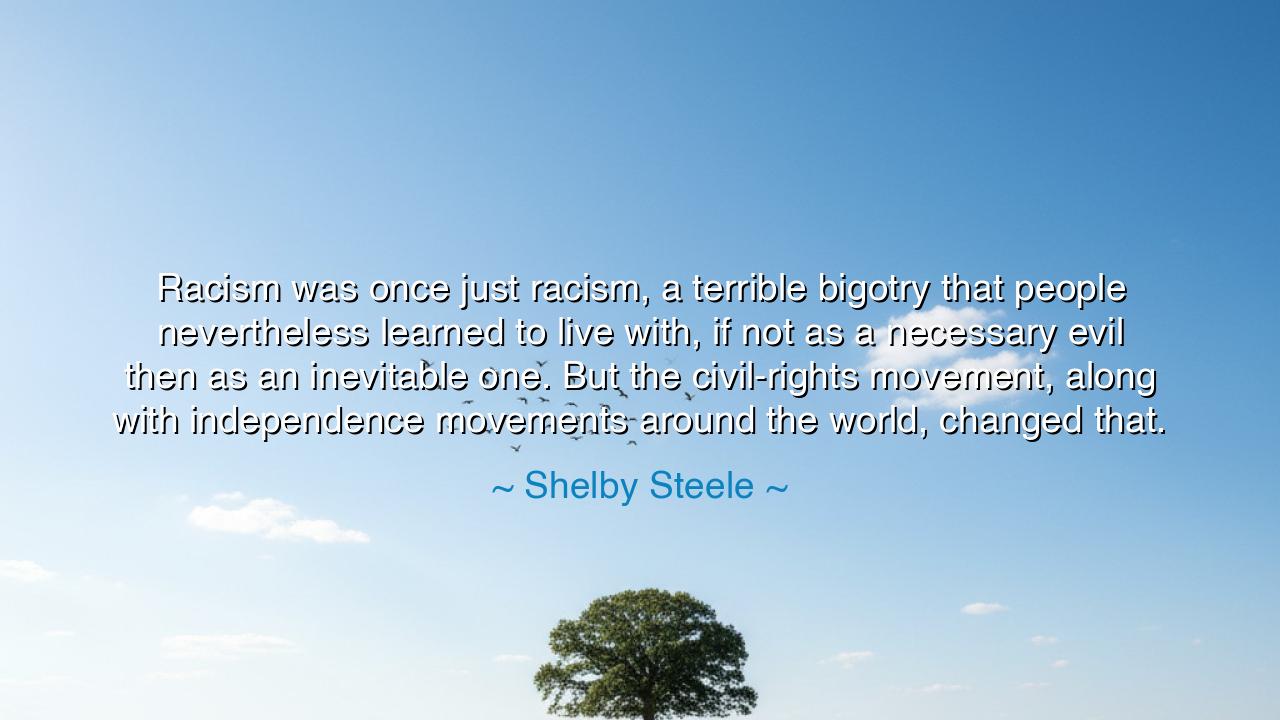
Racism was once just racism, a terrible bigotry that people
Racism was once just racism, a terrible bigotry that people nevertheless learned to live with, if not as a necessary evil then as an inevitable one. But the civil-rights movement, along with independence movements around the world, changed that.






The words of Shelby Steele, when he proclaimed, “Racism was once just racism, a terrible bigotry that people nevertheless learned to live with, if not as a necessary evil then as an inevitable one. But the civil-rights movement, along with independence movements around the world, changed that,” strike the soul like the tolling of a bell that announces both mourning and awakening. These are words steeped in history, forged in the fire of struggle, and tempered by the wisdom of reflection. They speak of the long night humanity endured under the chains of bigotry, and of the dawn that came when men and women rose to declare that dignity could no longer be denied.
In the first breath of this saying lies the truth that for much of human history, racism was not an aberration but a shadow accepted as part of the natural order. It was a sickness that had seeped so deeply into the bones of civilization that it came to seem inevitable — like winter, harsh but unchangeable. Empires were built upon it, and economies thrived upon its cruelty. People, blinded by the customs of their age, learned to live beside this evil, to justify it, or to ignore it. Such is the way of the world when conscience sleeps — injustice becomes ordinary, and what is monstrous becomes mundane.
But then came a stirring — the trembling of a world that could no longer bear its own hypocrisy. The civil-rights movement in America, and the independence movements that swept across Asia, Africa, and Latin America, broke the spell of resignation. The oppressed, long silenced, rose with voices that could no longer be unheard. In Montgomery, Birmingham, and Selma, black men and women walked with heads unbowed. Across India, the colonized shook off their chains through the moral might of Gandhi’s nonviolence. In Ghana, in Kenya, in Vietnam, in countless lands once ruled by distant masters, the cry was the same: “We are human, and our freedom is not yours to grant or deny.” Thus, the world shifted. Racism could no longer hide behind the mask of inevitability — its shame was revealed, and the age of awakening began.
Consider the life of Dr. Martin Luther King Jr., who stood before the multitudes and spoke not with hatred, but with hope. He declared that his dream was not for vengeance, but for equality — that one day his children would be judged by the content of their character and not the color of their skin. His dream was not his alone; it was the echo of generations who had borne the whip, the chain, and the silence. When he fell, struck down by the bullet of fear, the dream did not die — it took root in the conscience of the world. That is what Shelby Steele reminds us: that the civil-rights movement transformed not only the laws of nations but the moral language of humanity itself.
Before that revolution of spirit, the world endured racism as if it were a law of nature; after it, such endurance became impossible without shame. To call injustice “inevitable” was no longer acceptable, for the oppressed had proven otherwise. What had once been tolerated was now condemned; what had once been hidden was now exposed. This transformation, Steele observes, was not merely political — it was civilizational. It reshaped the very soul of humankind, awakening the awareness that no cruelty, however ancient, is beyond redemption if enough hearts are willing to confront it.
And yet, the lesson remains unfinished. For though the civil-rights and independence movements broke the chains of inequality, the struggle against prejudice did not end — it merely changed its form. Steele’s words carry both triumph and warning: triumph, in that humanity has learned to call evil by its true name; warning, in that memory fades easily, and moral clarity can be lost when justice becomes fashion instead of conviction. We must guard against the complacency that believes progress is permanent, for injustice, like shadow, returns wherever light grows dim.
So, O listener, take heed. The meaning of these words is not bound to one era or one nation — it is the story of every people who have risen from oppression to dignity. The victory of independence, whether political or moral, must be renewed in every generation. Let not the comfort of the present dull the courage of the past. Speak truth, even when it is unwelcome. Stand against bigotry, even when it is disguised in new forms. For as long as one soul is demeaned for the color of their skin, the work of freedom is unfinished.
Thus, the teaching endures: evil becomes inevitable only when good men accept it as such. The civil-rights and independence movements taught humanity to reject inevitability, to believe that moral transformation is possible. Remember, then, the lesson of Shelby Steele’s words — that the truest form of independence is not merely the breaking of chains, but the awakening of conscience. Let your life be part of that awakening. Stand firm in truth, act with compassion, and never accept injustice as the way things must be. For each generation is called to rediscover what it means to be free — and to defend that freedom with the strength of their spirit, the courage of their heart, and the clarity of their love.






AAdministratorAdministrator
Welcome, honored guests. Please leave a comment, we will respond soon